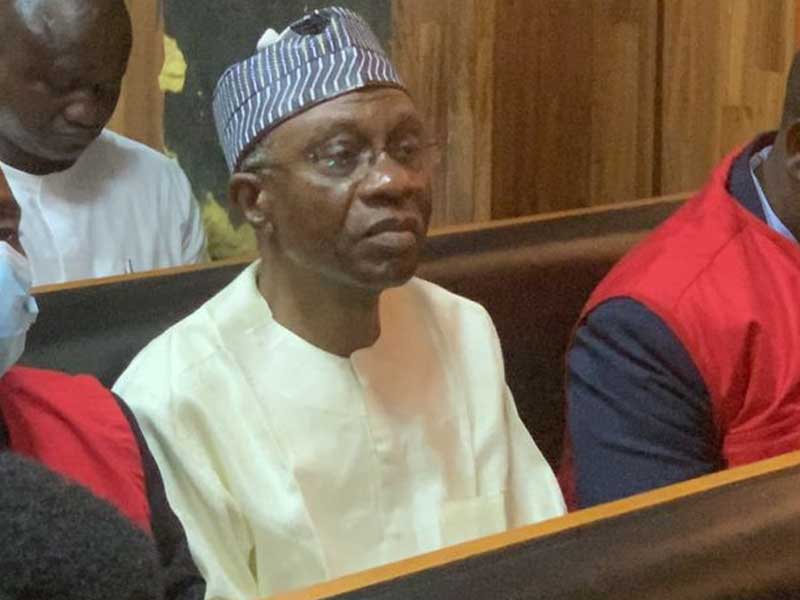
Justice Rahman Oshodi of a Lagos Special Offences Court has scheduled a ruling for February 26, 2025, to determine whether to continue with the case against the embattled former Governor of the Central Bank of Nigeria (CBN), Godwin Emefiele, who is facing allegations of gratification.
The judge set this date after hearing the arguments and submissions from the counsel representing both parties in the suit.
The Economic and Financial Crimes Commission (EFCC) has accused Emefiele of accepting gratification and making corrupt demands while in office.
Initially, the EFCC filed 22 counts of charges against Emefiele and Henry Omoile.
Emefiele is facing charges related to abuse of office, accepting gratification, and corrupt demands, while Omoile is charged with three counts concerning the unlawful acceptance of gifts by an agent.
Both defendants have pleaded not guilty to all charges, and the prosecution has commenced its trial.
In January 2025, during the trial, Justice Oshodi ruled on an application filed by Emefiele challenging the court’s jurisdiction.
The court struck out counts one to four, which pertained to abuse of office, and assumed jurisdiction over counts eight to twenty-two.
Read Also: Court Orders Interim Forfeiture of Emefiele Ikoyi Properties, $2.04m
At a resumed proceeding, the prosecution team, led by Mr. Rotimi Oyedepo (SAN), informed the court that the seventh prosecution witness (PW7), Adetola John, was present.
John testified that he had not received any complaints regarding the $400,000 he delivered as instructed during working hours.
A dispute arose when Emefiele’s counsel, Mr. Olalekan Ojo (SAN), objected to the prosecution’s request to allow the witness to read documents that the court had received for identification purposes.
Ojo argued that since the documents were already received for identification, the witness should not be allowed to read or discuss them.
The documents in question included a bundle containing WhatsApp messages from Eric, Emefiele’s personal assistant.
After Oyedepo (SAN) concluded the evidence-in-chief of the seventh prosecution witness, the court allowed the defense to cross-examine the witness.
However, Ojo (SAN) and Omoile’s counsel, Mr. Kazeem Gbadamosi (SAN), requested that the court recuse itself due to allegations of bias.
Ojo stated, “It is a matter of law under Section 221 of the Evidence Act. The court’s ruling regarding PW7 has demonstrated that the findings are prejudicial to the case.”
Also Read: Zenith Bank Plc’s Former Manager Convicted of $46,900 Fraud
The defense refrained from cross-examining the witness and, through an oral application, called for the court’s recusal based on the alleged bias.
In response, Oyedepo strongly opposed the defense’s application. “Your lordship has ruled against the prosecution numerous times. If the defense is dissatisfied with the court’s ruling, they can appeal. I do not understand what the defense aims to accomplish by requesting the court to recuse itself, as there exists no evidence of bias in this case. This seems to be a tactic to delay the trial.”
Rotimi urged the court to find that the defense had failed to substantiate the allegations of bias, citing the case of Adeogun Philip v. Gateway Portland Cement (2004 LPLR, page 54). He argued that the allegations should be documented through an affidavit, to which the prosecution could respond.
Ojo contended, “We do not need to file any affidavit evidence. What we are relying on is part of today’s record of proceedings. As we are human, this is proper in the circumstances. I refer to the cases of Azuokwuu Nwokanma & Anr (2005 LPELR) and Egbewole v. Adeleke (2018 LPELR 44857).”
Justice Oshodi cautioned both counsels as their arguments intensified. “You are all senior members of the Bar. I do not want any party to undermine the other. I will deliver my ruling on February 26, 2025.”
Earlier in the proceedings, Ojo notified the court of an application seeking permission for Emefiele to appeal the ruling delivered on January 8, 2025, which challenged the court’s jurisdiction to hear the case.
Consequently, Justice Oshodi adjourned the ruling to February 26, 2025.







